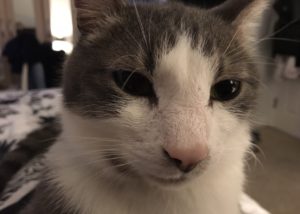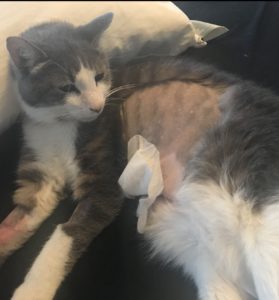It is that time of year where scary noises, sights and sounds appear. This includes Halloween, bonfire night and realistically, not long after, Christmas and New Year celebrations. In the next month, we will be focusing on noise phobias as this is the time to start making preparations!
Noise phobias
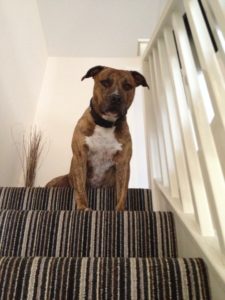 if your dog is sound sensitive it is probably a time of year that you dread! Unfortunately, it is now also starting to become less seasonal as people celebrate all types of occasions with fireworks. Dogs that have sound sensitivities to fireworks can become worse over time and will often extend to sensitivities involving gunshots and thunder. Sound sensitivities can also become generalised to other household noises such as open fire crackles, fire alarms and microwave pings, to name but a few. As a result, it is really important to try and address these sensitivities sooner rather than later.
if your dog is sound sensitive it is probably a time of year that you dread! Unfortunately, it is now also starting to become less seasonal as people celebrate all types of occasions with fireworks. Dogs that have sound sensitivities to fireworks can become worse over time and will often extend to sensitivities involving gunshots and thunder. Sound sensitivities can also become generalised to other household noises such as open fire crackles, fire alarms and microwave pings, to name but a few. As a result, it is really important to try and address these sensitivities sooner rather than later.
Dogs that need management for firework sensitivities ideally need a treatment plan starting in the new year when there is less chance of an event occurring. This will help to stop the progression of the sound sensitivities BEFORE the sensitive event. However, NOW isn’t too late and below are some tips to help with this year’s celebrations
Management Plan
Your management plan will depend on how your dog currently copes with their sensitivities. It is designed to minimise stress and help prevent progression of their phobias.
Management aims are:
- Develop coping strategies/encourage the existing strategy
- Environmental management
- Altering human interactions
1)Coping strategies
Dogs have one of four strategies available to them:
- Active exchange
- Avoidance
- Inhibition (passive exchange)
- Repulsion
When dogs want to actively exchange in information (active exchange) they may come across as being ‘needy’. It is important that you do not fuss them or ‘actively engage’ them but just simply drop your hand for them to sniff. Your dog may also lean against you and it is important for you not tense but to allow your muscles to stay relaxed. Tense muscles may indicate to your dog that you are worried too.
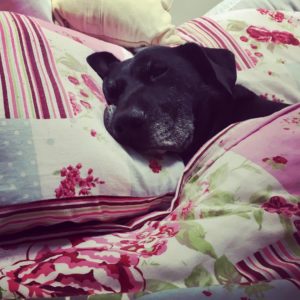 Some dogs just want to go and hide (avoidance) e.g. under the bed, under the stairs and let them! But they must have access to this resource 24/7. Dogs find it extremely stressful if they haven’t got access to their chosen hiding place.
Some dogs just want to go and hide (avoidance) e.g. under the bed, under the stairs and let them! But they must have access to this resource 24/7. Dogs find it extremely stressful if they haven’t got access to their chosen hiding place.
Other dogs just want to lie somewhere and observe their owners from a distance (passive exchange) so it is important that owners are calm and do not convey worry so they can collect positive information from them.
If your dogs is really overwhelmed then they could also show undesirable behaviours such as aggression (Repulsion). This may be directly towards the owner, another pet or to inanimate objects. This is because they feel the need to escape. It maybe necessary to seek veterinary advice for the best way to manage your dog if they are showing such behaviour before a treatment plan can be started.
2) Environmental management
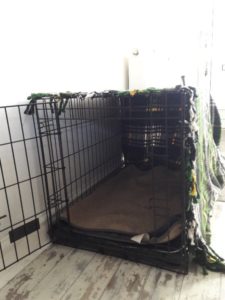 Dogs can be taught to use a safe place/hideaway that is a reliable escape. This should:
Dogs can be taught to use a safe place/hideaway that is a reliable escape. This should:
- Be dark
- Quiet
- Minimise the intensity of the event
- Have blankets for them to hide under
Back ground music can be played as long as it is something that occurs normally in the household otherwise this can be a predictable cue to an event happening.
When training your dog to use the hideout the use of artifical dog appeasing pheromones (in the form of plug-ins/sprays) can make it more appealing. Placing chews in the hide will also encourage them to think that it is a safe place to be. They may not eat them at first but the more they become settled in the hide the greater the chance of them starting to use them. Chewing is an important activity for dogs as it allows them to become relaxed.
3) Altering human interactions
Reassurance isn’t a natural canine response. It is a natural human response to comfort individuals that are scared. In canine language, huddling together occurs when everyone is fearful. Therefore, by cuddling your dog when they are unsure you are reinforcing that the event is something to be scared of and this in turn intensifies their negative emotion.
There is a balance; sometimes owners are advised to ignore their dog, but as previously mentioned dogs can actively seek information from you and so it is important to recognise their attention but in the correct way. If you ignore them completely you can cause frustration on top of their fear and anxiety. As a result, follow steps as described in ‘active exchange’. Most importantly, do not punish your dog for their actions as there is a risk that they will make further negative associations with this.
Further FAQ’s
What is the role of nutraceuticals?
A neutraceutical may be recommended to help support your dog during the management plan. Behaviuoral neutraceuticals are dietary supplements that usually contain B-vitamins and various amino acids. Amino acids such as L- Tryptophan and L-theanine stimulate the production of serotonin which plays an important role in maintaining calm and relaxation in animals. Deficiency in some B vitamins has also been associated with nervous and anxiety disorders. The aim of their use therefore is to reduce nervousness/anxiety thus increase their ability to learn and optimise their behavioural therapy program.
What is the role of medication?
Occasionally, it may be necessary to give medication to your dog at times when an unavoidable event is occurring. This is to reduce the negative emotional response to the predicted event and it will also limit the cumulative effects of repeat exposure. Behavioural medicine has come along way in the last 10 years and there are now more suitable medications with less side effects for use than previously recommended. If you have tried all of the above then please contact us to discuss further medical support.
In summary:
- Encourage existing coping strategies if they are working for them
- Try not to re-enforce fear but give them a hand to sniff if they want contact
- Encourage the use of a den that they can have 24/7 access to
- Use a hormonal plug in/collar
- A neutraceutical (dietary supplement) can be used
- If your dog is really stressed about noise such as fireworks, despite the above attention, please seek veterinary advice as they may be a suitable candidate for additional medication alongside a suitable treatment plan. Please contact us on 01606 880890
*Please keep an eye out for our next post where the lovely Riley works on her Noise phobia management plan*
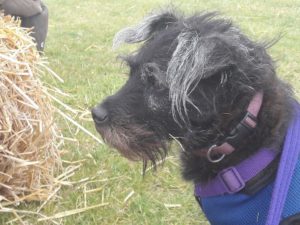 This is Riley an 11 year old terrier mix who presented with firework sensitivities at the age of approximately 4 years old. Her sensitivities have also progressed to gunshots and thunder. She has even associated precursors of these events such as heavy rain and will run and hide at the sound of this in anticipation of the thunder.
This is Riley an 11 year old terrier mix who presented with firework sensitivities at the age of approximately 4 years old. Her sensitivities have also progressed to gunshots and thunder. She has even associated precursors of these events such as heavy rain and will run and hide at the sound of this in anticipation of the thunder.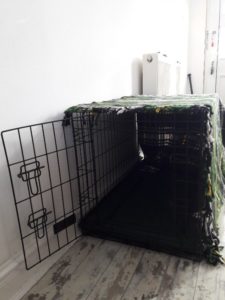 Riley has previously used a crate and so we have decided to develop this into a hide. This involves covering the crate to create a dark area and block out the noise. There is comfy bedding in there and also blankets for her to hide under if she needs to.
Riley has previously used a crate and so we have decided to develop this into a hide. This involves covering the crate to create a dark area and block out the noise. There is comfy bedding in there and also blankets for her to hide under if she needs to.



